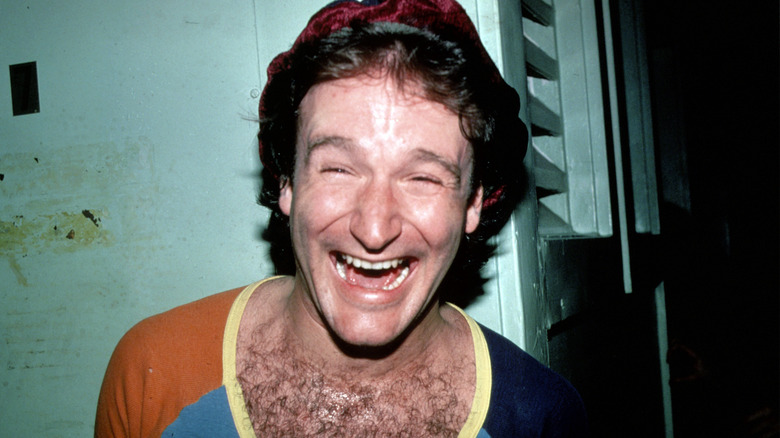The Heartbreaking Facts Discovered In Robin Williams' Autopsy Report
To say that Robin Williams' death in August 2014 left the world reeling would be an understatement. It wasn't just his passing, but also the manner of it — a suicide — that shocked and saddened fans everywhere. While the beloved actor and comedian had openly dealt with depression, his autopsy report revealed that he had been diagnosed with a disease that may have influenced his decision to end his own life.
Williams was found unconscious in his California home on August 11, 2014, with the Marin County police confirming his death shortly after emergency responders arrived. "This morning, I lost my husband and my best friend, while the world lost one of its most beloved artists and beautiful human beings. I am utterly heartbroken," his wife, Susan Schneider Williams, said in a statement obtained by Deadline. "On behalf of Robin's family, we are asking for privacy during our time of profound grief. As he is remembered, it is our hope the focus will not be on Robin's death, but on the countless moments of joy and laughter he gave to millions."
Initially, the police suggested that Williams died from "suicide due to asphyxia," a finding later confirmed by the autopsy, which specified death by hanging. What's more, it also revealed the presence of Lewy body dementia (LBD), which Schneider Williams said greatly affected Williams before he tragically passed away.
He was reported to have Lewy body dementia
In 2013, just a year before the world lost Robin Williams, he was diagnosed with Parkinson's disease. However, after his death, it was found that the diagnosis had been wrong. His autopsy revealed that Williams had been suffering from Lewy body dementia, a condition that is often mistaken for other neurological disorders. According to Norma Loeb, founder of the Lewy Body Dementia Resource Center, LBD is the second most common form of dementia after Alzheimer's disease.
LBD results from the buildup of the protein alpha-synuclein, or Lewy bodies, in the brain, causing severe damage effects. Those afflicted by LBD endure a host of symptoms, including but not limited to depression, anxiety, insomnia, hallucinations, incontinence, and various cognitive problems that affect their judgment and ability to plan. "People with LBD, unlike early Parkinson's, will exhibit cognitive impairment, behavior issues and have fluctuations in alertness," Loeb explained to USA Today.
In an interview with CNN, Susan Schneider Williams shared how painful it was to discover her husband's diagnosis only long after he'd been gone. "None of the doctors knew that there was this ghost disease underlying all of this," she said. "When that was revealed, that was like essentially finding out the name of my husband's killer." She also shared with People that while it's true that Williams had dealt with depression, LBD was likely what ultimately led to his death. "It was not depression that killed Robin," she said. "Depression was one of let's call it 50 symptoms and it was a small one."
How the condition affected Williams
In his final days, Robin Williams tried his hardest to keep showing up for work even as LBD wreaked havoc on his life. Sadly, his performances weren't what they used to be, leaving him downright miserable, according to his son, Zak. "There was a focus issue that frustrated him. There were issues associated with how he felt. And also from a neurological perspective — he didn't feel great," he shared in a "The Genius Life" podcast appearance. "There was just more anxiety and depression and just things he was experiencing and talking to me about that made me realize he was very uncomfortable."
Susan Schneider Williams provided further insight into his struggle in a piece for Neurology, describing LBD as the "terrorist inside my husband's brain." The disease initially manifested through physical symptoms such as constipation, insomnia, and hand tremors, but soon escalated to severe psychological ones like paranoia and delusions. "Robin was losing his mind and he was aware of it. Can you imagine the pain he felt as he experienced himself disintegrating? And not from something he would ever know the name of, or understand?" she wrote. "He kept saying, 'I just want to reboot my brain.'"
In the end, when Williams made the heartbreaking decision to end his life, Schneider Williams found it in her heart to forgive him completely. After the emergency responders couldn't save him, she shared with ABC News that she was able to send him her final message. "And I got to tell him, 'I forgive you 50 billion percent, with all my heart,'" she recalled. "'You're the bravest man I've ever known.'"



